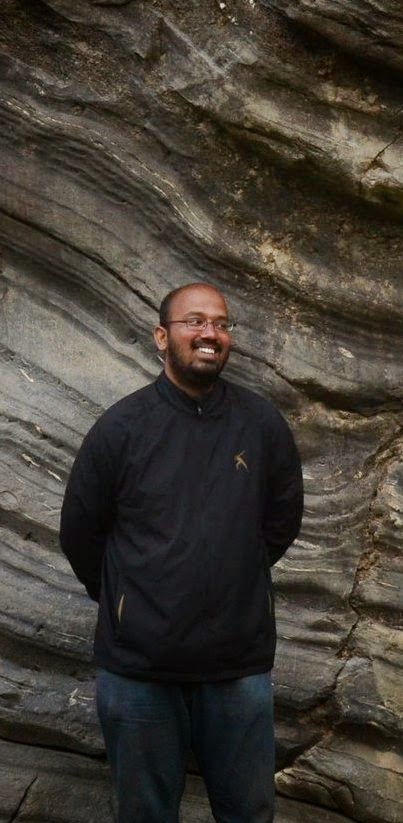An Interview With The Interviewer:- Anuj Agrawal, Associate-Editor of Bar & Bench talks about his love for traveling, his college days, about Law School Darshan and more.

For The Sake of Argument catches with with the dynamic and witty Anuj Agrawal, Associate-Editor of Bar & Bench, the person behind those amazing interview Law students routinely follow. The following is the interview conducted via email.
Sourya (S):- You are generally used to be the one asking the questions. How does it feel to be on the other side of the interview?
Anuj (A) :- Odd. Very odd.
S:- How long have you been associated with Bar & Bench?
A:- Lets see. I joined the Bar & Bench team in the last month of 2011 so it is going to be three years this December.
S:- Why this ‘unconventional’ choice of career?
A:- You know, I wish I could give you a well thought-out answer to this but the truth is that it was a pretty impulsive decision. I had just quit litigation in Delhi, and was doing the odd drafting work in Bombay when the opportunity to work with Bar & Bench came up.
I always wanted to write and Bar & Bench seemed the perfect platform for this. Plus, very early on they offered to send me all over the country and visit different law schools. And pay me for it. So that was quite difficult to turn down.
S:- Were you always inclined towards law from your childhood days?
A:- Not really. I don’t think I was ever “inclined towards law” to be honest. Not having to study engineering or medicine seemed like a good enough incentive to join law and that was that. (Hear Hear)
S:- Tell us something about the ‘Law School Darshan’ section.
A:- The Darshan series is probably my favourite B&B series and it all started at this extremely casual meeting back in January 2012. It was actually an offshoot of our Law School Rankings project, an initiative that eventually could not take off. Anyway, the fundamental idea behind the Darshan series was to provide a first-hand account of life at different law institutes across the country. So you go there, spend a couple of days and speak with the students, the professors and the Vice Chancellor.
One of the goals of the series was to move away from this vague and slightly infantile, “My school is better than yours” chitchat that is so common, and actually examine if and why one law school was better than the other. And there is such a dearth of information on these institutes anyway.
Of course, there are inherent limitations of a two or three-day visit, especially when it comes to culling out the negatives. But at least you could provide a glimpse, no matter how tiny, of life inside a particular institute.
Looking back, the series has allowed me to meet far too many interesting people, have some great conversations (often over fantastic food) and see parts of the country that I would have otherwise not got a chance to visit.
Oh and did I mention I got paid for this?
S:- What is the most drastic change you have noticed between law students back in your time and now?
A:- Eh? Back in my time? You make me sound like an uncle.
Hmmm, well one of the things I have noticed is that students are a lot more confident of what they want and are not afraid of going out and getting it. I also see a lot more students attending moots, conferences, travelling the country and the world, and using up as many opportunities as they possibly can.
Having said that, I do think that more and more students are equating the jobs they aspire for or get with their self-worth and this is a bit discomforting.
Damn. I am an uncle.
S:- Tell us something about your own Law School days.
For me, the best bit about studying law was that I got to spend five years in Calcutta. And for this, I shall be eternally grateful. Calcutta is a city like no other, occupied by some of the loopiest people on this planet. It was phenomenally cheap, friendly and caring and I really cannot think of a better city to be a student in.
The hostel rules were fairly relaxed and by the time we graduated, the mess food was actually quite good so there really wasn’t too much to complain about in that department.
As far as the course itself was concerned, lets just say that you had to really make an effort to fail. I think the opportunity to excel was always available, and a lot of my peers exercised this option.
S:-There is a growing trend of Law students starting up, branching out and connecting with the practical world right from their college days. Do you consider this a temporary passing trend or a revolution of the law schools system?
A:-Well, I certainly see a lot of entrepreneurship amongst law students in the recent past and I think that is just fantastic. There are so many students who are not only coming up with innovative, and economically viable ideas, but executing them. And I noticed this during my student days as well; people from junior batches just going ahead and getting things done. It is most commendable.
I also think that there is a clearly identifiable connection between law and entrepreneurship, and more and more students are maximizing this. If you think about it, a law degree can give you a superb understanding of the practical, day-to-day workings of a business or a venture. I certainly hope that this is not a passing trend.
In my opinion, there is no other undergraduate degree in India that gives you the kind of freedom that a law degree does. The number of doors that a law degree opens up for you – it is unbelievable.
S:- NASSCOM had once presented a report stating that 80% of engineering graduates are unemployable (i.e not fit to be employed.) even though they have a degree. Do you feel that law students are better prepared to tackle the practical world in this aspect?
A:- I haven’t read the NASSCOM report but I did come across this one in 2013 prepared by an organisation called Aspiring Minds. It looked at undergraduates from 3-year bachelor programs and rated them on their “employability”. One of their findings was along the lines of half of all graduates not being “employable” in the knowledge economy. It is worth a read.
As for your question, I don’t think law students in particular are at any advantage over their peers in other fields. As far as litigation is concerned, there are so many things that you can only learn through practical experience and I imagine this to be true for a law firm as well. And it is important to recognize this.
Also, I personally don’t think that a law degree should only be viewed as a means of future employment. It can be, or rather it ought to be, so much more. Sure I understand that not everyone has the luxury of a loan-free education or the absence of economic compulsions. I understand this. But by reducing the study of law to a source of livelihood, by viewing the course as a purely professional one, I think you are denying yourself a number of possibilities.
S:- Having interviewed numerous famous lawyers, what is the one common feature you would say is present in all good lawyers?
A:-That is an interesting question. One commonality I have found, and this is something that makes interviewing them all the more fun, is their ability to gauge what the listener wants to hear. And then say exactly that.
This is not to say that they actually give a fig about my approval but it is more about how adept they have become at sensing the mood of their audience. So you really have to try hard to get them to drop their defense, get them to reveal just that little bit more than they would have wanted to. And when you do succeed in doing this, it can be quite a good feeling.
S:- Could you give us a sneak peek into what interviews you have planned next?
A:-Sure. We are building up our collection of interviews with “non-NLU” professors, there are a couple of senior advocates from Gujarat we interviewed, and a senior law officer from Goa – these all should be going up in the next six weeks or so.
I also want to build on the Law School Folk series so if any student-run committees are interested and reading this, you know whom to contact.
Oh and we are also looking at building a photo database of law-related photos, something along the lines of the Indian Memory Project, but only for lawyers. So that should be quite exciting.
S:-Your proudest moment, while being associated with Bar & Bench, till date?
A:- Can’t really remember a specific moment though there were a couple of times when people I respect and admire complimented me for an article or an interview. That felt pretty good.
S:- Lastly, through your years of experience interacting with legal professionals, lawyers, judges and students, what advice would you give upcoming lawyers and law students.
A:- This is not advice but just an observation made – if you really put your mind to it, and I do mean really, anything is possible.




Leave a Reply